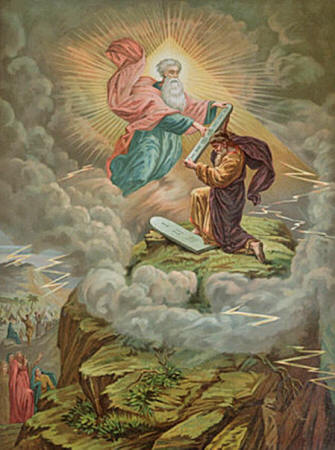|
|
|
from
Examiner Website
The Myth of the
Israelite Lawgiver
Predictably, the vote followed along party lines, with the board's 10 Republicans accepting the textbooks, while the five Democrats gave the material thumbs down. This important controversy extends well beyond Texas, as that state is highly influential on the rest of the country's school curricula.
One of the contended claims in the
approved textbooks is the representation of the biblical figure
Moses as a "Founding Father" and influence on the American
Constitution. As Christian News reports:
Countering this claim are numerous historians and secularists, as related by The Washington Post:
Many people thus have spoken out against the textbooks, as at the meeting on the previous Tuesday open to the public, reported by MSNBC:
As "progressive secular humanist" Michael Stone observes:
In sum, critics say the textbooks falsely declare that Moses was "the inventor of democracy" and "author of the Constitution."
Another critic, Robyn Pennacchia, rebutted the notion that the Constitution was based on the Bible's notorious Ten Commandments:
'Moses Deniers'
These salient concerns were dismissed by "far right" activists labeling these historians and others as "Moses deniers."
Yet, according to factual, historical and scientific evidence these textbook critics are substantially correct and possibly did not even go far enough in their "Moses denial," as the biblical patriarch appears to have been not historical but mythical.
These skeptics include the head of the Texas division of American Atheists, an imposing man who goes by the name of "Aron Ra."
In September of 2014, Aron Ra had appeared before the state school board to speak against the contentions in the textbooks concerning Moses in particular, arguing that the biblical character does not even appear to have been a historical figure and that the Ten Commandments were not influential on the "laws of this land."
Aron also discounted the biblical Exodus as a historical event, citing the lack of scientific evidence.
To counter the textbooks claims, Aron contacted me about my book 'Did Moses Exist? - The Myth of the Israelite Lawgiver', which he felt might contain information valuable to this textbook controversy.
On November 20, 2014, Aron, his partner Mark Nebo of BeSecular.com and I had a discussion concerning this subject of Texas and Moses. After having studied a significant amount of the evidence I present in my book, Aron declared the tome an "impressive piece of work" and "definitive."
The information contained therein does indeed present a scientific case that Moses and the Exodus are mythical, not historical, which would mean that the Texas textbooks indeed are misrepresenting "history."
Evidently exasperated following the school board vote, Aron remarked on his blog (11/22):
In order to address this contentious issue, a number of petitions have been created, including one entitled, "Repeal Biased History Text Book Decision!"
A Great Moral Compass?
Even if the American Founding Fathers themselves were not "Moses deniers" to the extent that they perceived him as a myth - although there is evidence that some of them questioned the historicity of another biblical figure, 'Jesus Christ' - the textbooks overemphasize Moses's role in the American Constitution and omit the horrors represented biblically in his name.
These atrocities attributed to Moses include wanton slaughter of thousands of non-Israelites such as the 30,000 Midianite men, woman and children in Numbers 31.
According to the Bible, Moses inquired of his men whether or not they had killed all the women and taken the virgin girls for their sex slaves, ordering them to do so:
This instance of genocide, misogyny and sex slavery is only one of several attributed to Moses and/or the early Israelites (see also Exod 17; Jos 6, 8, 10).
To teach school children that the orchestrator of such violence and bigotry is a "great man" and an American Founding Father seems to critics to be egregious.
In consideration of this fact, some might argue that being a "Moses denier" is a good thing.
Judeo-Christian Foundation?
Texas state school board member David Bradley, a Republican, echoed the views of many Americans, when he stated in defense of the textbooks:
How "Judeo-Christian" the American Constitution truly is, however, has been the subject of a massive debate for decades and likely will not be settled by forcing children to learn what analysts argue are palpably false representations of history.
Future Developments
There is hope on the horizon for separation-of-church-and-state advocates, as the school board agreed to continue reviewing the materials in question, according to NPR:
While Republican religious fundamentalists may have won Round One, some critics say the debate is far from over, and lawsuits may need to be filed challenging the constitutionality of the textbooks.
In the meantime, this controversy underscores the need for critical, scientific analysis of religion to be taught in our educational system, rather than proselyting religious doctrine of any kind.
Unlike the 'Ten Commandments', this secular stance is provably Constitutional yet not Mosaic:
In fact, were such a figure as the biblical lawgiver real, he would disapprove of our "godless" Constitution and assuredly would not claim authorship of it.
Multimedia
Did Moses Exist? ...with D.M. Murdock
|


